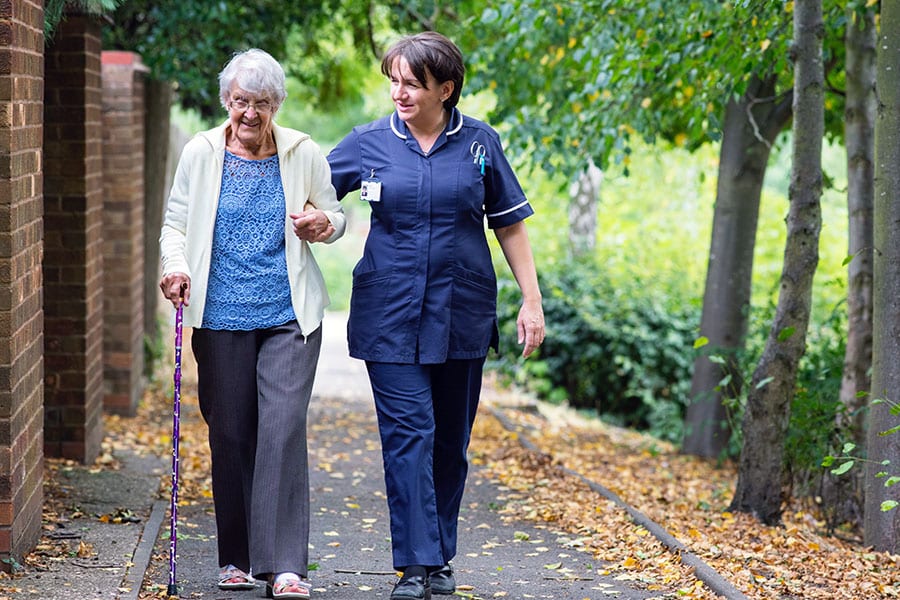When caring for a loved one suffering from dementia, it can be difficult to fully communicate with them. Communication can become increasingly challenging for those with dementia. It jumbles the brain’s judgment, memory, and reasoning; which can make it especially difficult to understand and stay with conversations. Below are a few tips that can help you and your family better communicate with a loved one suffering from dementia.
Communication and Making Eye Contact
It may sound fairly easy, but using eye contact can make all the difference. Eye contact conveys care, and priority. Simply put, it tells them that you are listening. Making eye contact is essential for communicating and engaging with non-verbal dementia sufferers. In time, you could be able to tell if they are anxious, sad, or tired from looking them in the eyes. The more practice you have making eye contact with the individual, the more intuitively you can tell how they are feeling. While making eye contact, look for signs of understanding.
Communication with Short, Simple Sentences
Talking slowly and simply can help them understand what you are trying to communicate. Unfortunately, longer sentences can be hard to keep up with, for them. Speaking with a slower cadence can help them process the information more easily.
Be Aware of Your Own Emotions
Body language and tone can convey a lot, even to those who may not be fully cognitive. Make note of the energy you bring when you interact and communicate with them. If you are frustrated, they can become frustrated. When you are sad, they can mirror this. Because of this, staying positive and keeping calm with your loved one can help them feel the same. For more information on emotions and Dementia, see our article here.
Focus on What They Can Still Do
As dementia progresses, you’re loved one can lose many of their skills. Common, ingrained practices, like cooking or playing the piano can slowly be lost. But rather than telling them no, help guide them through what they can. A dementia patient may not be able to follow all the steps of a recipe. But you can measure out the ingredients, and let them stir. For more advanced cases, you can bring the wheelchair into the kitchen and let them take in the smells of the ingredients as you cook. Doing so still activates many sense-memories, and can still cause enjoyment.
Be Proactive With Communication
Many dementia patients suffer from “sundowning,” where they get more frustrated or agitated later in the day. During this time, it can be difficult for them to engage with people or convince them to do other tasks. Being proactive can help you keep them engaged ahead of time. Help them do activities before their “sundowning” time, and they may stay more attentive. Take them for a walk, or help them do an art project.
Keep Yourself Happy
Many family caregivers put their impaired loved one above anything else. While this can be great for their loved one, it ends up causing issues. Practicing self-care can make you feel better; which can make your loved one feel happier in turn. Neglecting your own needs can make you sad or resentful. Take some time for yourself when you need it. Practicing self-care can be an important part of staying positive and working towards better communication.
You Are Not Alone
It is perfectly fine to ask for help when caring for a loved one. While friends or family can lend a hand, consider looking towards professional assistance for more in-depth aid. Hiring a home health aide to help care for your loved one means that you can ensure their needs are met, along with yours. You shouldn’t have to choose between your welfare or theirs. For over 53 years, SafeHarbor Healthcare Services have been pairing families with quality home health care professionals. Our home health aides and nurses can work with you and your family to ensure that your loved one is taken care of.
Safe Harbor Healthcare Services does not provide medical or healthcare advice via articles. This material has been prepared for informational purposes only, and is not intended to provide, and should not be relied on for medical advice.
Safe Harbor Healthcare Services has been providing excellent home care on Staten Island since 1967. Our services help the elderly and disabled live safely and independently; while giving their families the peace of mind they need. For more information contact Safe Harbor by clicking here, or call us at (718)-979-6900.

